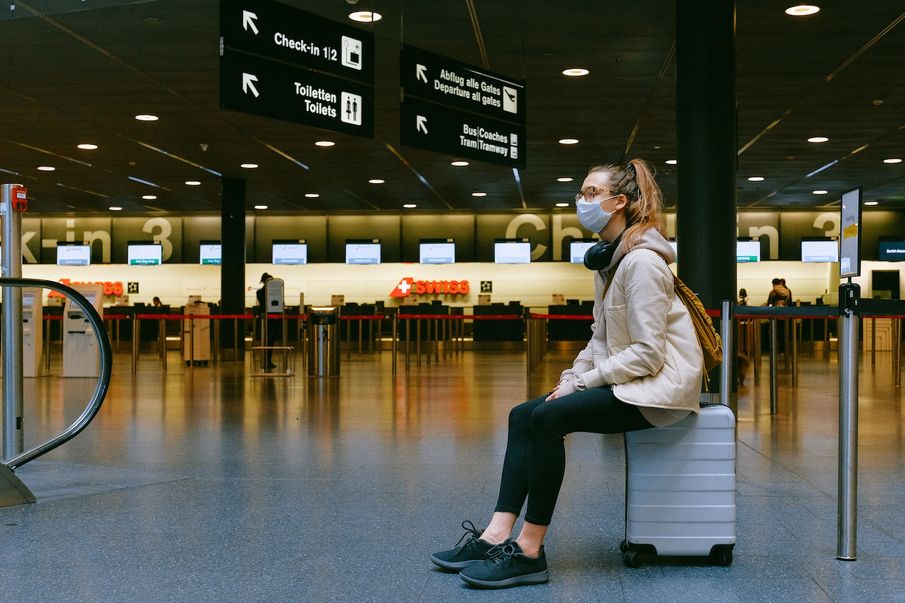With mask mandates starting to lift on some airlines, there’s a new layer of worry for travellers
During the pandemic, most travel was restricted. A lot of us were confined to our homes or the occasional local walk and for some this became a comfort zone of sorts. Recently I had to travel by train to speak at a conference and stay overnight in a hotel. I realised as the day approached that I was feeling more anxious about the travel than the public speaking, and judging by a quick poll on my Instagram stories, I wasn’t alone.
As well as not being used to travelling and having to step out of our comfort zones, there’s a new layer of anxiety to contend with - the worry about catching Covid.
While some people have already flown to far-off destinations, some of us are approaching trips for the first time since the pandemic started. Understandably, there may be some trepidation. On top of the travel anxiety, there may be pandemic-related admin requirements like organising lateral flow tests the day before flying (and crossing your fingers you’ll be fit to fly), and wearing masks on the flight.
This week, however, we’ve had the news that the US will no longer be enforcing mask mandates on planes or trains. For some this news was a welcome relief, for others it’s a disappointment and added worry.
Non-US airlines may have different rules and requirements, so it’s worth checking with your airline directly before you fly.
Whether you’re feeling a new twinge of anxiety around flying, or your existing fear of flying has gotten worse, know that you’re not alone in how you’re feeling. Here are some ideas that may help.
Focus on what you can control (and let go of what you can’t)
At its core, most anxiety is about control. So it can help to recognise what you do have control over. For example, you can choose to wear a mask while travelling, even if it isn't required. You can choose to give yourself plenty of time to get to the airport. You can choose how you spend your time before the flight to help you feel calm.
There will also be elements you can’t control, of course. Sometimes acknowledging this in itself can be freeing. Letting it go may not come so easily, but this is where therapeutic support may be helpful. Cognitive behavioural therapy is often recommended for anxiety and hypnotherapy is becoming increasingly popular for both anxiety and phobias.
Consider hypnotherapy to ease anxiety
The reason hypnotherapy is so powerful for anxiety and phobias is that it works on a subconscious level. It’s here, in the subconscious that fears and phobias operate from. They may not be rational, so trying to be logical and batting the fear away with statistics doesn’t always help.
A hypnotherapist will use hypnosis to offer positive suggestions, helping to essentially rewire your thinking when faced with anxiety. If you want to use hypnotherapy for fear of flying, be sure to allow yourself time to attend sessions before your trip. Many hypnotherapists will also give you self-hypnosis tracks to listen to while flying.
Avoid caffeine and alcohol
Anxiety can often be exacerbated by too much caffeine or alcohol, so it may help to lay off them during your flight. Instead stick to calming herbal teas and water to stay hydrated. If your anxiety leads to an upset stomach, you may also want to ensure you’re eating simple foods that won’t make you feel unwell.
Transform anxiety into excitement
Now, this is easier said than done, but to our body, fear and excitement feel very similar. It can help to focus on the purpose of your trip - what awaits you when you touch down? If you’re going on holiday, focus on the new experiences you’re going to have. If you’re travelling to see a loved one, think about how great it’ll be to see them in person.
Use this as a focus when anxiety comes up and remind yourself that you have done scary things before and survived. You can do it again.
While we hope these tips can help, it’s worth noting that for those who are clinically vulnerable, it isn’t just about easing anxiety (especially when mask mandates are being lifted). It’s about doing what feels possible and reasonable to you in terms of travel, and for more allies to advocate for the vulnerable.
If you're ready to try hypnotherapy, you can find a hypnotherapist on Hypnotherapy Directory.


Comments